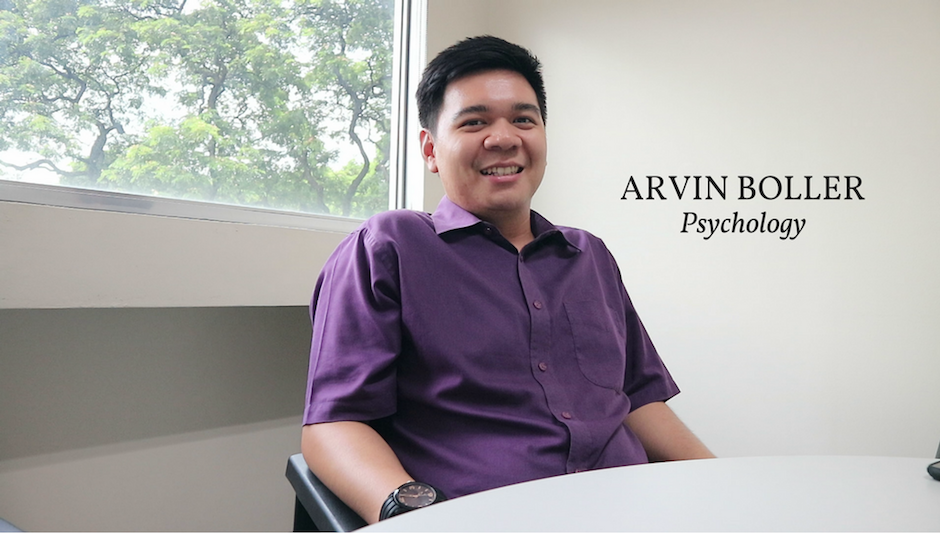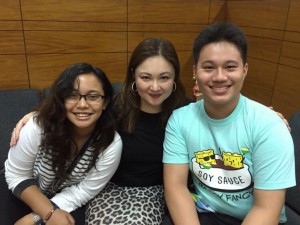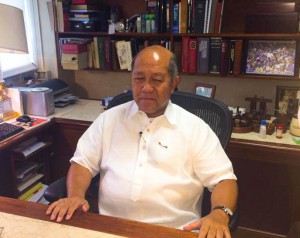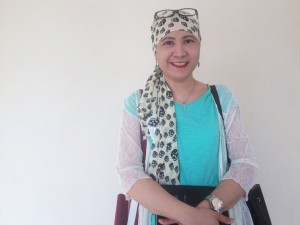Written by Pau Era & Edited by Nathan Cotoco & Dave Ong
Ubiquitous with his trademark blue polo, most students address him with “Sir” but replace the polo with a collarless black shirt and he’ll blend in the crowd of undergrads, enough to be called Kuya Arvin, just as how he is called by some members of Gabay today. But don’t be fooled by the “kuya-af” exterior because beyond it lies a passionate mentor whose questions can make you rethink not just your research proposal but also your perceptions of yourself and the world. In Celadon’s Teachers’ Appreciation Week interview, Sir Arvin Boller, a PhD candidate and Lecturer in the Psychology Department, talks about his life as free-spirited Ateneo undergrad, his motivation for teaching, “Sir ID po?” encounters, and the many serendipities in between that shaped him to become the teacher that he is today.
“Kuya” Arvin as an undergrad:
OrSem for the “disaster batch.” What’s special about our batch is that we were the “disaster batch” wherein H1N1 happened a few weeks before the start of college life and then Ondoy later on. We were forced to postpone OrSem until two weeks after class [started]. So imagine your TNT saying, “hey guys, this is Kostka Hall, and this is Berchmans!” and we were like, “yeah, we just had class there yesterday.”
Free-spirited with no permanent tambay place. I entered [a bit young at] sixteen so I actually became legalized within the context of college midway, but in general my college self was a bit free-spirited. I did not have a permanent peer group so I had a lot of friends and I usually kept on my own. I was not studious. I studied but not as much. I really enjoyed working with organizations and side-projects. [For hobbies,] I was in a band and whatever I can do to spend time to enjoy. I did not really have a permanent tambay place… but maybe there [are] two locations that might be close to that kind of definition. One would be Zen Garden, I always hung out [there] especially during my earlier college days. The second one would the org rooms in MVP [such as] Psyche, Gabay, or Sanggu.
Who I am as a professor is a mixture of my experiences as a student. [I had] a lot [of memorable profs] so it’s really hard to pinpoint one specific person because, to be honest, I had the luxury… to be a student to a lot of legendary teachers. For example, first year I already had Dr. Lagunzad for Botany, then of course you have Father Dacanay [for Theo], Ma’am Cleofas for Ethics so I cannot really say that there’s just one. There are a lot of teachers that taught me a lot, Sir Pochi Velasquez [and Doc Cuenca] would be a good candidate for [best]. So really, if you ask me, I would probably say that who I am as a professor is really a mixture of all of my experiences as a student from these really, really great teachers.
The best piece of advice I got as a student… Although Father Roque did not tell me this personally but I think a lot of Ateneans know yung “lundagin mo beybe!” Just do it. To be honest, a lot of my life after undergrad was really a series of leaps of faith. I applied for my scholarship not knowing whether I’ll be granted or not. Actually, a big part of myself thought na it will not be granted. Even Ma’am Milet said that I might not be in the priority list because I don’t have any work experience but I did it, I just tried it and it happened. If you see an opportunity, try to grab it, do your best, and let God do the rest.
On becoming a teacher:
Guard to Arvin: “Sir, ID po?” May mga times na pag bagong rotate yung guards, di nila ako kilala so they ask me “Sir, ID po?” Then [I bring out my ID and show it to them,] “HA! FACULTY!” So yeah, it happens sometimes. My tip for young profs with the same experience would be to just go with the flow. It’s part of life. Just rationalize that you should be flattered that a guard thought you were a student.
Actually, I did not plan on becoming a teacher prior to taking Masters. What actually happened was that time during the “funemployment” period, I realized [that it] seemed fun to take a Masters in psych and [I] would want to stay in Ateneo for a bit more time. So I went and took a Masters and then when I was asking myself, “what will I do with this,” I tried to tap my memories as a member of several organizations and I realized I actually had fun training students. I had fun teaching people especially when I was in the Sanggunian Department of Research and Statistics. I used to give statistical training to some of the members who actually enjoyed it. So I said to Dr. Ofreneo that I would like to become a teacher, or partly a part of me wanted to become a teacher when she interviewed me during the Masters application so that that’s really the start of this journey of a lot of serendipities. You won’t really realize that you want to become a teacher until you become one.
The best and worst part of my job. Of course, worst part would be checking, especially when you require individual papers. At one point, I had to check 120 papers and it becomes hard after some time [when] you keep on seeing the same story. Maybe the best part is really knowing your students beyond the context of the classroom. For me, in my own opinion, the task of the teacher as a formator goes beyond the classroom. Knowing the lives of your students, what they ate a while ago, what makes them happy, what’s their passion? All of those really allow you to see glimpse of the life of these students, the people that you’re teaching every day, in a different light. Really, that’s the best part because you get to know more about others, you get to know more about yourself and what you can do as a teacher and to realize that your job doesn’t start and end in the four walls of the classroom but mainly how you try to touch and be touched in terms of lives. How you make a difference, even minuscule differences might be significant enough.

On growing as a teacher:
Doubt is really part of becoming a teacher. Especially during the early days of your job, you would constantly ask yourself, “do I deserve to teach these students? Do I know enough about this material?” Even until now, you would constantly doubt yourself but hopefully not to the point that you will be paralyzed. It can happen and it’s normal because I think even in the academe, doubt [and] uncertainty are really part of it. To be honest, it might even be a virtue because, like what I said to my students, the only time that you should be afraid is when you’re no longer uncertain. When you lose the feeling of uncertainty, that’s when you should be afraid because you’re already too confident of yourself. So doubt, especially in the field of knowledge, should always be there because it’s partly about humility and that you should accept that you do not know everything. By having that kind of acceptance, you will allow yourself to learn from your students. You will allow yourself to make mistakes every now and then, and most importantly, you will allow yourself to learn [because] how can you learn if you’re [already sure] of what you’re doing? What’s good about teaching is that it’s constantly evolving even if you’re teaching the same subject. Over time you will add more and more stuff [and] you become better.
Teaching becomes worth it when you realize that it’s beyond you. Maybe one of the things about teaching in the Ateneo is that you will get the comments from your students every semester. Students may look at [the faculty evaluations] as a nuisance but it’s actually very validating. The hard part about being a teacher is that you do not know whether you’re doing your job or not, you do not know if you’re doing the right thing or not. So when you receive e-mails from students thanking you—letters that say they appreciate the time, they appreciate the semester—it makes teaching more worth it. And that you will realize that “hey, I don’t know if they will remember what amygdala is two years from now or what is the elaboration likelihood model,” but the fact is, at some point in their lives, you were able to intervene and make a difference. So it’s not really one event [that solidified my decision to teach], it’s really multiple events that really motivate you as a teacher. What makes it worth it is when you see your students succeed, establish themselves, their identities, and become happy people. Teaching becomes worth it when you realize that it’s beyond you. Ask [yourself,] “how are your students faring? How are they applying your subject? How do you see your lessons manifest in their lives every day? In the end, are they a better person because of the education?”
What inspires me to do what I do… would be my students. When you teach, you really have to let your students inspire you. There would be a lot of moments when you want to stop, you want to quit but what I do is that I always tell myself, “This is for the students.” I have a duty towards my students, I have to do this, not just because I’m paid to do it for my students, but because my students rely on me to do my job. So I have to do it in the best manner that I can.
Advice I would give to my students… Siguro the connecting piece to that advice is “Do not be afraid to make mistakes.” A lot of people get paralyzed because they over-think the bad things that will happen if they make a mistake but at some point you have to do it even if you think you have a chance of making a mistake. Siguro the only thing that you have to be concerned about is, “Will that mistake harm others or yourself?” For me, the highest ethical action would be to ensure that whatever your action is, if it goes bad, it’s only you that will be harmed… do not be afraid to make mistakes, but at the same time, ensure that [in those] actions, you [put] yourself on the line more than others.
For students who want to laude and landi: Use your landi as motivation. Tips to be laude and landi is… to be honest, I don’t know because I’m not very good with the landi part. I’m quite inept and I don’t even know what flirting is. I don’t know if people are flirting with me, I’d rather not assume [and since] I’m not good with the landi, I opted to do the other one. But I have observed people that have done both the laude and the landi. [So] it’s really kaya. Use your significant other as motivation to become a better person. Sabi nga ni Father Dacanay, “love is about the extension of oneself for the spiritual growth of yourself and the other.” So use your passion, your motivation from your significant other to become a better person and to become a better student. [B]ecoming a good student is not just about grades but becoming really a more whole person and that will [make] you a better significant other.
One more reminder: Teachers’ Appreciation Week continues until Friday, September 29, 2017! Catch us at Kostka Extension & JSEC, where Ateneans can write special heartfelt letters and give special lanyards to their favorite professors. For more information, follow the official TAW page on Facebook!




